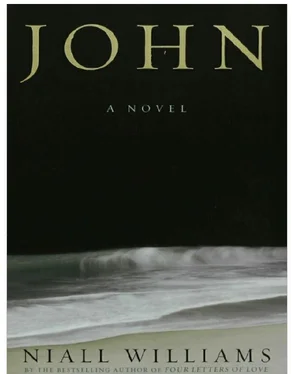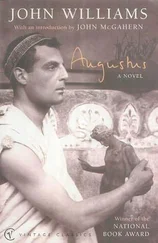From all, the angel chose the island, and lifted and lowered its wings mightily and swooped invisible down.
Now, here, at the entrance of the cave, it comes. Appears from within a great illumination, a thousand lamps large, dazzling to human sight. In accompaniment is a sound, sweet, melodic, music without playing. He folds to him his golden wings. He comes from the light and is clear and beautiful to behold, face becalmed, demeanour serene, as though journey from the ranks of seraphim in heaven to the place beneath is not arduous or lengthy.
'Prochorus,' the angel says.
The man bows low to the ground, then drops to his knees.
'Prochorus,' the angel says again.
The scribe cannot believe the angel knows his name. Then he believes it and believes his reward is at hand, believes when he rises that he will assume eternal form and begin his own ascent. His being is filled with gratitude and surrender. Upon his face is a look of transport.
Then he feels himself shaken. A hand touches his cheek.
'Prochorus!'
And he opens his eyes and sees Papias standing there.
'Wake, Prochorus, wake. Where is the Master?'
The angel is gone. There is only the looming face of the youth.
'Prochorus, the Master is not here.'
The scribe is curled on the floor. Chastened by the vanity of the dream, for some moments he cannot stir. It is as though, returned to earth, he is made of weightier stuff and will not be able to stand. But the look of Papias is wild and urgent, and Prochorus presses against the burden of disappointment and rises.
'How long have you been asleep?'
Prochorus does not answer. He crosses the cave with the lamp to where the Apostle had last been sitting. He looks into the empty space in puzzlement. Papias comes to his shoulder. Neither of them say what crosses in their minds. Neither say that perhaps the Apostle has been taken from them.
'Go, wake the others. Call his name. Quickly, quickly,' Prochorus says.
The dawn is near to breaking. There is a chill wind. Papias hurries away across the rocks, while Prochorus stands and cups his hands and calls after the Apostle. His voice travels nowhere. The sea sighs back at him and he feels unwell. He calls again, and again. He goes some way along the upper ledge of the scarp and stumbles and falls forwards, and fears then the blind apostle has plunged off the edge to death in the rocks below. The thought is as a sickness and he lets out a cry.
Across the darkness the other disciples come. Shades against the blued blackness of the predawn, they announce themselves like seabirds by calling. Their master's name is cried over and over. They assemble and disperse, assemble again. None admonishes Prochorus for sleeping when he was to be watching. The business of finding the Apostle is too urgent. Even the elder, Ioseph, is with them now, and with him the wheezing, anxious figure of Simon.
'Where might he be gone? This is not good. This is not good.' Simon wrings his hands.
Ioseph is swift and decisive. 'Two along the upper rocks,' he says, 'two to the eastern ledge. Linus and Prochorus go above to the meeting place, either side of the pathway. He may be fallen. Simon stay here. Papias and I to the foreshore.'
'I am more nimble, I will go with him.' It is Matthias, who appears out of the dark.
'Very well. Simon, remain here by the cave lest he come.'
'But why is he gone?' Papias asks.
'Go,' Ioseph says. 'Hurry.'
A dull daylight greys the island. The figures of the disciples clamber away, calling. They are like ones abandoned in the dark. Across the air no seabirds fly, and the bleak sky above the island seems lidded closed. Matthias moves quickly, his thin figure light. He stops calling. From the foreshore he considers the ledge above them, the fall that would be fatal. Papias is behind.
'Do you think he is perished?'
'Papias, are you unwell? Your face is pale.'
'I am. . I may have taken ill in the night. Do you think he is perished?'
Matthias looks at him in the thin light. He does not answer. He thinks: What will it mean for them if the Apostle is gone? Without him what will be the hope for their faith enduring there in banishment on the island? What if he is simply wandered out in the dark and fallen to death? What if he has simply succumbed to the fate of the aged or infirm? A mere human ending. It will mean nothing; his power will fade away. There will have been no sign, no miracle. They will feel cheated; they will hunger for a new master.
'I will go the southern shore,' Matthias says. He points in the opposite direction. 'Can you walk that way?'
Papias nods.
'If you find him and he. .'
They look at each other, then away. They do not say. Matthias's impatience is clear; the old man cannot be left alone; that is what their living has become, minding him on an island. He shakes his head at the thought of it, then he is gone up on to the large rocks, where a man falling from above would be broken like a shell.
Papias prays as he walks. He scans the upper shore, the grey sand where gulls stand curious over spews of seaweed, the smoothed salted stones. The morning is bleak and cold. His eyes are rheumy, blurring the middle distance so a blackened mound of algae, or rockweed might easily be the figure of a fallen man. Papias fists an eye, the other blinks into the bare wind. Is that him? His sandals quicken on the sand, sinking some and making jagged twists of his prints. His heart races, his prayers are stopped. He runs lamely, wound in ankle smarting, pushing back with his hands parcels of the air, wavering his head to and fro and blinking for vision. The black mound, is it the Apostle's white garment sea-spoiled? Did he fall blindly into the sea? Papias clambers on to the first of the rocks, his ankles angled over and slipping, his body pitched forward so he feels for balance with his hands. He progresses, and then stands, fists his eyes again, and sees that the mound is not a man but a large, dark fish haloed with flies.
Momentarily, Papias sits, sighs relief. A needle of pain presses in above his left eye. The fish is of great size and without wound. It lies on one side with mouth pursed and flat incurious eye, its scales lustreless beneath the leaden sky. How it arrived so far up the rocks, what ailed it, age or disease, are not apparent to Papias. It seems to him a strange portent, and for a moment he delays on lunatic logic: the fisher gone, a fish in his place.
He looks at it, waves away flies: is it living still? Is it beached and in need only of return to water? It may be, and is briefly puzzling for reasons he cannot shape, but Papias cannot delay. He steps back, the flies return. He scratches at his face and moves back down the rocks again, hurries limping once more along the grey sand.

My soul longs for you.
Each day, each night.
I have loved you with my life, Lord.
As the vine for water, my soul thirsts for you.
Come, Lord.
I have remained.
Come for me now and take me to you.
This is my prayer. Now, Lord.
Now.
Further along the shore Papias finds the footprints. The parting tide has left a virgin floor of sand, and upon it in the curved pathway of the blind is a pair of barefoot prints. Heel-heavy, stagger-stepped, by the white salt frill the prints make a route towards the water. Papias hurries after them. His head is still needled, his stomach unwell. Is a fever establishing in the caverns of his body? Warm droplets glisten on his brow, fall like stars past his eyes. The prints blur in the softened sand and sink, vanished into the shallow pools and low waters of the tide. Papias feels his heart drop. The Master is gone into the sea, he thinks, and without reason he thinks again of the large fish, the symbol of the Christian, beached on the stones, and steps himself into the first skirting wave. The water is shocking with cold. It seizes his ankles like ice manacles, burns his toe wound. He is gone, he thinks, gone; and with utter grief he scans the waves coming toward him and thinks he will fall into them and never rise such is his loss and guilt and regret.
Читать дальше











